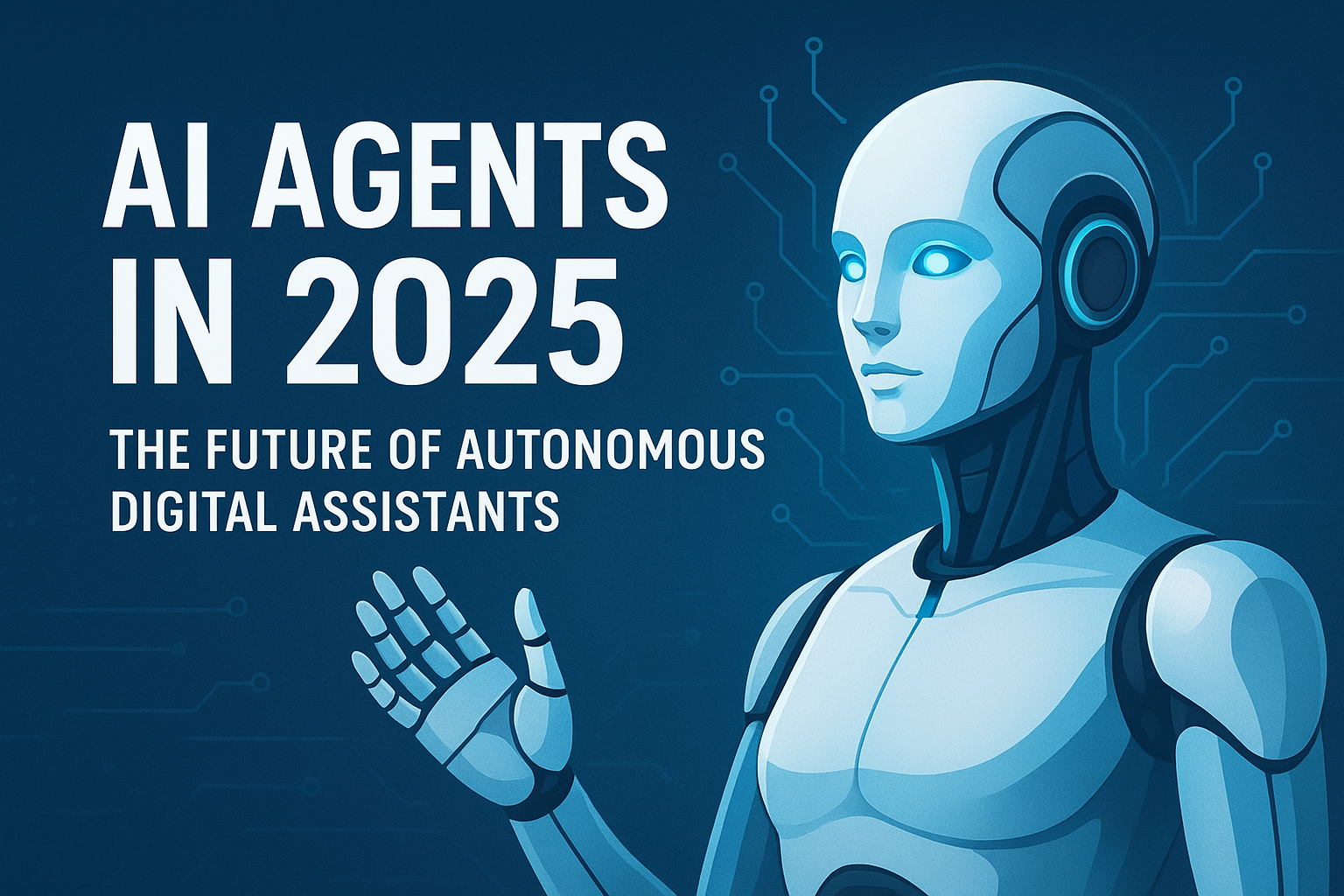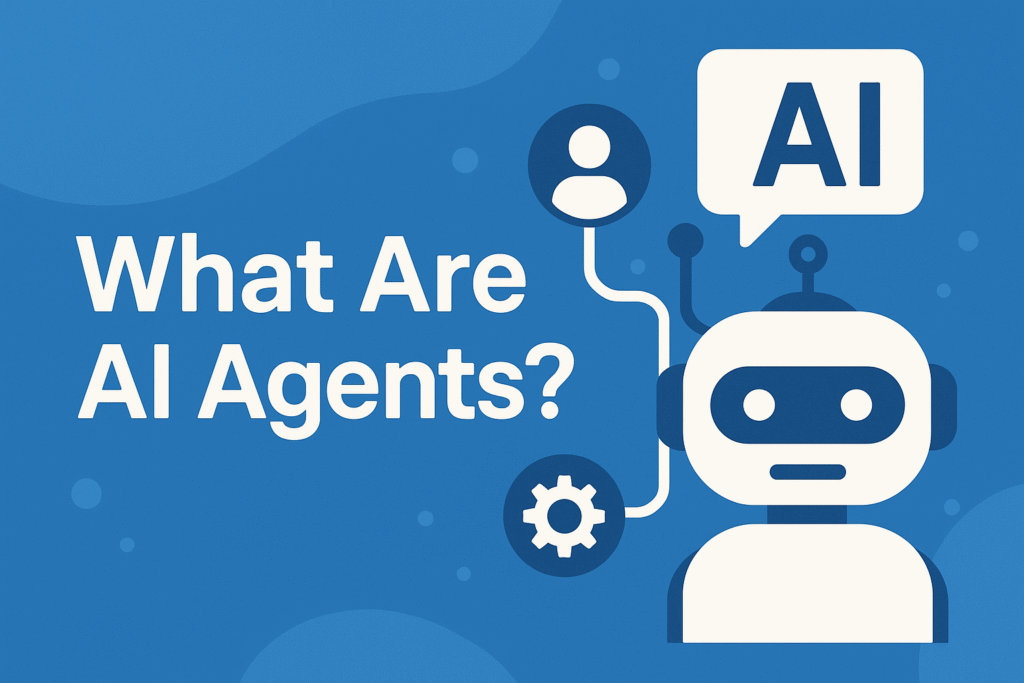AI agents are rapidly becoming the backbone of the digital world in 2025. These intelligent systems are not just tools—they are digital partners capable of handling complex tasks, saving time, and boosting productivity across industries. From personal productivity to enterprise workflows, AI agents are redefining how we interact with technology.

Imagine waking up to an AI that already scheduled your meetings, analyzed your emails, and created a daily action plan tailored just for you. This is not science fiction—this is the reality AI agents are bringing into our lives today.
Understanding AI Agents
AI agents are autonomous systems powered by artificial intelligence. They leverage machine learning, natural language processing (NLP), and decision-making algorithms to perform tasks independently. Unlike traditional AI tools like chatbots or simple virtual assistants, AI agents act more like digital employees. They can:
- Understand and interpret user goals
- Plan multi-step actions
- Execute tasks across apps and tools
- Learn and adapt over time
Think of AI agents as smart collaborators who can manage projects, respond to changes, and interact with other AI agents autonomously.
Why AI Agents Are So Popular in 2025

The surge in AI agents’ popularity comes from technological advancements and growing user demand. Keywords like AI agents, autonomous AI, personal AI assistant, and multi-agent systems have skyrocketed in search volume this year, reflecting their mainstream adoption.
Personal AI Assistants for Everyday Life
Platforms such as OpenAI GPT-powered agents, AutoGPT, AgentGPT, and Devin empower individuals to automate:
- Writing emails and messages
- Scheduling meetings
- Managing files and research
- Summarizing information
With these assistants, users can save hours each week, letting them focus on creative and strategic work.
Enterprise Integration
Businesses are embracing AI agents for:
- Customer Service: Agents respond to queries 24/7.
- Marketing Automation: Drafting campaigns and analyzing engagement.
- Software Development: Code generation, debugging, and testing.
- Data Analytics: Tracking KPIs and generating actionable insights.
Open-Source AI Agents
Open-source frameworks like LangChain, CrewAI, and SuperAGI have made it easier for developers to create their own AI agents. These customizable agents allow businesses and individuals to tailor capabilities for specific needs.
Real-World Applications
AI agents are already making significant impacts across industries:
Devin by Cognition AI
Devin is dubbed the first AI software engineer, capable of writing, debugging, and building applications autonomously.
ChatGPT + Memory
With memory features, ChatGPT functions as a personalized AI agent, remembering preferences and improving task execution over time.
Healthcare AI Agents
Doctors now use AI agents for diagnostics, patient tracking, and real-time support during surgeries, improving both efficiency and patient outcomes.
Other Industries
Finance, logistics, education, and marketing are also leveraging AI agents for better accuracy, automation, and strategic insights.
Benefits of AI Agents
AI agents provide significant advantages:
- ✅ Time-Saving: Automate repetitive tasks
- ✅ Enhanced Productivity: Focus on high-value work
- ✅ 24/7 Operations: Continuous workflow without fatigue
- ✅ Error Reduction: More precise outputs than manual work
- ✅ Continuous Learning: Agents improve performance over time
These benefits make AI agents indispensable tools for both individuals and enterprises aiming for efficiency and innovation.
Challenges to Consider
Despite their advantages, AI agents have certain challenges:
- ⚠️ Data Privacy and Security: Sensitive data requires strict protection
- ⚠️ Accuracy Issues: Agents may produce hallucinations or false outputs
- ⚠️ Ethical Concerns: Responsible and controlled usage is essential
- ⚠️ Computing Costs: Advanced AI agents may require high computing power
Understanding and addressing these challenges ensures AI agents are used effectively and safely.
The Future of AI Agents
AI agents are evolving rapidly:
- Collaborative Multi-Agent Systems: Teams of AI agents working together on complex tasks
- Emotional Intelligence: Understanding human emotions for better interaction
- Strategic Decision-Making: Data-driven, autonomous business decisions
- Physical Operations: Integration with robots, drones, and IoT devices
Businesses adopting AI agents today are likely to stay ahead of the curve in productivity and innovation.
How to Get Started with AI Agents
To make the most of AI agents:
- Identify repetitive tasks that can be automated.
- Set clear goals for your AI agent.
- Integrate agents with your tools and platforms.
- Monitor performance and optimize regularly.
- Stay updated on emerging AI frameworks and trends.
With these steps, both personal users and enterprises can maximize the potential of AI agents.
FAQ: Frequently Asked Questions
Are AI agents safe to use?
Yes, with encryption, security measures, and ethical guidelines.
Can AI agents replace humans?
No, they are designed to assist humans by automating routine work.
How much do AI agents cost?
Costs vary—open-source agents are free but may require technical skills; enterprise agents have subscription fees.
Which industries benefit most from AI agents?
Healthcare, finance, marketing, software development, logistics, and education.
What’s the future of AI agents?
Greater autonomy, emotional intelligence, multi-agent collaboration, and integration with physical systems.
Conclusion
AI agents are not just technology—they are partners shaping the future of productivity and innovation. By automating tasks, improving efficiency, and enabling smarter decision-making, they are becoming essential tools in 2025.
Whether you are an entrepreneur, developer, content creator, or healthcare professional, AI agents are ready to transform workflows, streamline processes, and redefine efficiency for everyone.
